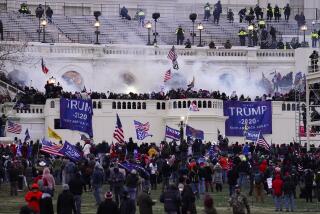3 Members of Terrorist Cell Sentenced
- Share via
PORTLAND, Ore. — The last three members of the so-called Portland Seven terrorist cell were sentenced Monday for trying to join the Taliban shortly after the Sept. 11 attacks on the Pentagon and World Trade Center.
Palestinian-born Maher “Mike” Hawash, 39, expressed remorse for his actions and pledged loyalty to the United States before he was sentenced to seven years in prison. Two brothers, Ahmed Bilal, 25, and Muhammad Bilal, 23, were sentenced to 10 and eight years, respectively. Neither made a statement.
In the fall of 2002, federal investigators indicted six Portland-area Muslims on charges of conspiring to wage war against the United States. The seventh member of the cell was arrested later.
Hawash -- a former software engineer -- was the first of the group to plead guilty to a lesser charge of conspiring to help Al Qaeda and the Taliban during the war in Afghanistan. In exchange for a lighter sentence, he became the government’s crucial material witness and testified against the others.
“I reiterate my acceptance of full responsibility for this act. I do not blame anyone else,” Hawash said in a statement to U.S. District Judge Robert E. Jones.
“This act was done by me in a highly emotional state and was completely out of my character. When the media began to point at Muslims, I couldn’t believe it.... I did not believe that the Afghan people had anything to do with this.
“I am still proud to be a U.S. citizen, and I regret my actions,” Hawash said. “I wish to ask forgiveness from my family, my friends in this community and the people of the United States.”
At the time of his arrest, Hawash was working at Intel Corp. -- so well-liked by his colleagues that they began a “Free Mike Hawash” campaign.
“From the beginning, Mr. Hawash has been a mystery to the court,” Jones said before handing down the sentence. “How a man of such extreme success could commit this act ... I don’t know.”
Jones concluded by saying he was convinced that Hawash would “never commit a criminal act” again.
The Bilal brothers also pleaded guilty to conspiring to help Al Qaeda and the Taliban and to firearms charges in exchange for dismissing the main charge of conspiracy to wage war against the United States.
Daniel Feiner, the lawyer for Ahmed Bilal, said his client believed he was doing the right thing at the time but later concluded it was wrong and had been preparing to turn himself in when he was arrested.
The younger brother, Muhammad Bilal, was merely following his older brother’s lead, according to his lawyer.
Muhammad Bilal’s attorney Andrew Bates said: “My client is an ordinary person, 21 years old at the time of this misadventure. Like all 21-year-olds, he was seeking his path.”
In November, two other members of the Portland Seven were sentenced to 18 years in prison. Patrice Lumumba Ford, 32, and Jeffrey Leon Battle, 33, had pleaded guilty to conspiracy to levy war against the U.S. Only Ford and Battle refused to cooperate in the investigation.
The only woman in the group, October Martinique Lewis, was sentenced in December to three years in prison after she pleaded guilty to wiring money to help the group. Investigators say the accused ringleader, Habis Abdulla al Saoub, 37, was killed in October during a Pakistani raid of an Al Qaeda encampment.
The seven got to know each other during gatherings at two local mosques: the Masjid As-Sabr in southwestern Portland and the Bilal mosque in nearby Beaverton, Ore.
They came to call themselves “Katibat Al-Mawt,” which prosecutors said loosely translated to “squad of death.”
Court documents that depicted the seven as a loose-knit group who studied books and films on jihad and participated in firearms and martial-arts training before the Sept. 11 attacks. Members expressed interest in becoming martyrs.
The U.S. invasion of Afghanistan, whose Taliban government supported Osama bin Laden, prompted the six men of the group to join the fight against U.S. forces.
In October 2001, they traveled to China, where they tried several times to cross into Pakistan but failed because of visa problems and heightened Chinese security. Most of the group eventually returned to Portland.
*
Marshall reported from Portland and Tizon from Seattle.
More to Read
Sign up for Essential California
The most important California stories and recommendations in your inbox every morning.
You may occasionally receive promotional content from the Los Angeles Times.









